Petina Gappah sat down with The JRB contributor Bongani Kona.
Gappah is a Zimbabwean writer with law degrees from Cambridge, Graz University and the University of Zimbabwe. Her debut story collection, An Elegy for Easterly, was shortlisted for the Orwell Prize, the Frank O’Connor International Short Story Award and the Los Angeles Times Art Seidenbaum Award for First Fiction, and won the Guardian First Book Prize in 2009. Gappah is also the author of the novel The Book of Memory, which was longlisted for the Bailey’s Women’s Prize for Fiction, shortlisted for the Prix Femina étranger and awarded the McKitterick Prize from the Society of Authors in 2015. Her most recent book, Rotten Row, is a collection of short fiction.
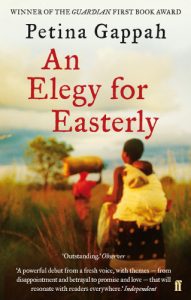
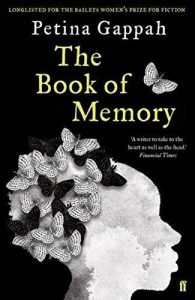
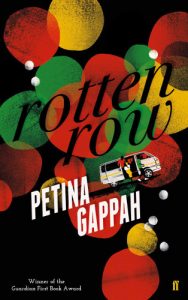
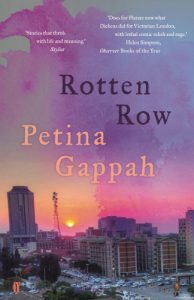
Read together, Gappah’s works comprise a chronicle of ‘what it has meant to be a Zimbabwean in recent times’. In the interview, Gappah speaks about the high and low points in her writing career, and reveals the title and subject of her next novel—which had just been confirmed at the time of writing. The book has been percolating in her mind for twenty years, she says: she first saved it on a floppy disk.
Bongani Kona for The JRB: I’d like to begin by quoting a sentence from TT Moyana’s 1976 essay, ‘Problem of a Creative Writer in South Africa’, in which he says: ‘An additional difficulty for the creative artist in South Africa, especially the black writer, is that life itself is too fantastic to be outstripped by the creative imagination.’ Moyana was of course talking about apartheid South Africa but my guess is that his observations would resonate deeply with fiction writers from Zimbabwe. Has that been your experience?
Petina Gappah: That is such a great quote, and yes, some of the reception to what I write finds an echo there. A lot of my writing is triggered by something true, either something I read in the papers, something I overheard—I am an inveterate eavesdropper—or something that happened in my very large, and very extended, family. And yet it is precisely those things that no one believes are real.
Take ‘The Death of Wonder’, the ‘ghost’ story in Rotten Row. It is partly inspired by the tale of a young man who was murdered in the village of Gokwe, but who ‘refused’ to stay dead as his spirit wanted to avenge his death. I don’t believe in vengeful ghosts myself but I was writing a story set in a rural village where such beliefs are prevalent. I wanted to respect, and indeed to honour, those beliefs even while questioning them, so I made my narrator a sceptic.
The murdered man is not so much a ghost as he is a manifestation of collective guilt; his restless spirit ravages the village in a quest to right a world that has been upended through the horrible violation of his murder. This is the kind of ghost we call ngozi; it is not an incorporeal entity but a vengeful force.
The Book of Memory also has an ngozi theme, and I will go back to the idea of ngozi in my future work. The concept interests me both as a writer and a lawyer: it is one of the most powerful tools of social control that our ancestors developed. How do you prevent and punish murder in a society with no jails? There was banishment of course, but ngozi was the most powerful deterrent. Commit murder and you damn your descendants until reparation is made. It is an extraordinary belief, terrifying really, the idea of vengeance being pursued through the generations. It also has something powerful to say about restorative justice.
I have found that I cannot write about my people without writing about some of these beliefs, even though the beliefs may seem, at first sight, to be out of step with modernity.
The JRB: Your work, beginning with An Elegy for Easterly, moving to your debut novel, The Book of Memory, and then to your most recent collection, Rotten Row, has chronicled, with humour and sensitivity, ‘what it has meant to be Zimbabwean in recent times’, as you once summed it up in an interview. I know you wanted to be a writer and a journalist after high school, but you went on to study law at the University of Zimbabwe, then on a master’s degree at Cambridge and a doctorate in International trade law at the University of Graz, in Austria. Did you continue writing while you pursued your studies?
Petina Gappah: For many reasons, mainly to do with the bottlenecking of education for black people in Rhodesia, I was the first descendant of my paternal and maternal grandparents to go to university. We are talking the first in three generations. Actually, in all generations! Big things were expected of me, and my teachers and parents encouraged me to be what my father called a ‘Professional’.
In contrast, I wanted to study English or history and be a writer, but I was not sure how that could be because when I was growing up there was simply no Zimbabwean who was like me: black and female, who wrote novels in English. There were no black Zimbabwean women writing fiction in English—Zimbabwe was a baby country when I was a child. We are talking years before the advent of Yvonne Vera and others. I knew only male black fiction writers. In my final year of school, I was delighted to meet a lawyer called Valeria Muchero who came to talk to us about careers in law. Her life seemed more real and possible to me than Dambudzo Marechera’s, for instance.
In fact, it was only when I was in the third year of my law studies that I read Tsitsi Dangarembga’s Nervous Conditions, the first novel in English by a black Zimbabwean woman. It had been published five years before, in 1988, and had a profound effect on me. It shifted everything for me. But I read it in 1993, and by then I was one year from finishing my studies. Luckily, I found I really loved the law, and had an aptitude for it.
But though I studied law for eight years in total, and worked as a lawyer for fourteen, there has never been a time, since the age of eleven, in which I did not write. A lot of my early work was mimicry. As a ballet-loving, horse-and-dog-crazy kid, I wrote ballet stories and stories about horses and dogs—without ever having danced, ridden or owned a dog. I wrote nonsense poetry in imitation of Ogden Nash and Hilaire Belloc. I wrote plays that we performed at school. I then wrote a science fiction novel set on Mars, complete with illustrations. At some point in my late teens, I wrote a Mills and Boon. In my student years, I was hit hard by The Ragged-Trousered Philanthropists and by Marx and Engels, and wrote atrocious Marxist-Leninist inspired poetry. So I accumulated copious amounts of stuff at various stages of completion.
The JRB: What relationship did you develop between your writing and the law?
I think I am a better writer for being a lawyer. My mind is pretty chaotic because I am interested in so much, but it has been disciplined through my legal studies. I want to believe I am more measured in my responses to events, and that I am more analytical of my own motivations and self-justification. I am strongly opinionated but I have learned the gift of dispassion. Being able to look at both sides means that I am interested in the roundness of things, whether arguments or people. There is always another side, even regarding things on which I have strong opinions.
So, for instance, I think it is a spectacularly unfunny joke that anyone thinks that Mugabe, who is so frail and has failed so spectacularly, is, at ninety-three, the right man to stand for another election next year, because he has to complete his ‘vision’ or ‘mission’. Honestly, if you have not achieved your vision at the age of ninety-three, after a fairly autocratic rule of thirty-eight years, it may be time to go into a different line. It may be time to give up the day job. And yet there are people who believe that only he is the answer. So I try to enter into their minds because I am interested in all viewpoints. In fact, I think I am most successful when I write about people who are as different from me as possible. I am interested in writing into being a Zimbabwe that feels complete, and not one that is only peopled with those of whom I approve.
The JRB: What does your life look like now, do you work as a writer full-time? Or do you have a day job?
I worked in Geneva until August last year. I now live in Berlin, where I have been given the generous gift of a DAAD Artist-In-Residence fellowship. It is a year-long residency that they call ‘the gift of time’; it’s yours to do with as you please. I sometimes go to Rwanda and Tanzania to teach international law to government officials, and I travel to festivals that I am invited to but, for the most part, I am using this gift of time to be a full-time writer.
Bongani Kona: I’ve heard you speak elsewhere about feeling like an impostor following the incredible reception of An Elegy for Easterly and the heightened expectations for The Book of Memory. What are some of the difficulties you encountered during that period and what helped you overcome them?
Petina Gappah: I had one of those Zadie Smith deals where publishers get excited by five or so chapters and offer a book deal on the basis of those chapters. Then they published the stories while waiting for me to deliver the novel. And the stories were received so warmly, with modest commercial success. It was all so surreal. All I had to do was deliver the novel, and that’s when things went badly. My mind became this churning maelstrom of self-doubt and guilt. I was hit by a terrible case of imposter syndrome, a condition that affects a lot of people who appear outwardly successful—especially women. I call it public success masking private failure. It hit me particularly hard. I was convinced that I had succeeded in pulling off the most spectacular con in the history of publishing. I felt like an imposter, a fraud. I was convinced that I would be found out somehow.
I had a really hard time with that novel. I eventually delivered after six years. In addition to imposter syndrome, I found myself fighting against my own internal standards of success, which had little to do with external validation. So I was my worst critic, and even when I was told the novel was good, I did not believe it. I have not read it since I handed in the final proofs on 19 June 2014, and if I must read from it in public I read only preselected passages that are as short as possible.
But I am glad I had that experience, because it taught me the kind of writer I am. Now, I write for myself, and only if I have completed something to my satisfaction will I send it out.
The JRB: What would you say is the difference between working on a collection of stories and working on a novel, and do you prefer one over the other?
Petina Gappah: It’s hard to say because I have really only just begun: I have written just two of each, I mean two novels, and two story collections. I loved writing my latest novel, but did not enjoy writing my first one. I really loved writing Rotten Row, every line was a joy. I don’t really feel I wrote An Elegy for Easterly because we simply chose stories I had written at different times over a two-year period and made them into a book.
So I would say it is not so much about the form, but about the circumstances under which I wrote the different books. In many ways, I feel like a software program that needs constant upgrades and reboots. Rotten Row was an upgrade. The new novel, I hope, is a complete reboot in that it is unlike anything else I have written. That’s how I want to write, constantly improving, and surprising myself. I want to write with clarity and precision at what my friend the Nigerian critic Oris Aigbokhaevbolo calls the ‘sentence level’. I had the amazing opportunity to be published by The New Yorker last year, and the intense and immersive process of being edited by a team of three people: the fiction editor, a fact-checker and a proofreader, all for one short story, really raised my game in terms of how I edit my own work.
The JRB: Rotten Row is such a unified collection and, much like The Book of Memory, it combines two of your great passions—literature and the law. How did the idea for the book come about?
Petina Gappah: I am so glad you think it’s unified because that is exactly what I hoped to achieve. I even ‘storyboarded’ it, and drew family trees to work out how some of the characters were related. I have some characters walking into other stories as well as their own. And two characters make their way from An Elegy for Easterly and The Book of Memory. There is also a whole family from a future book …
I started writing Rotten Row before I delivered on The Book of Memory. The trigger was one of the women that Memory meets in prison. I decided to write her story as a stand-alone story called ‘A Small House in Borrowdale Brooke’. Then I read a German writer called Ferdinand von Schirach, who wrote a mind-blowing book of short stories based on his work as a criminal defence lawyer. That inspired me to do a series of stories about the causes and consequences of crime. But I can never stick to just one idea, so the book is also a meditation on the nature of justice, mercy and forgiveness, and it is also about different forms of faith.
The JRB: One of the things I admire the most about your writing is that you have such a fantastic ear for how people speak. I felt like I was in the middle of Harare, in the middle of all that vibrancy and chaos. How do you manage to capture the voices? Do you often go back to Harare?
Petina Gappah: It’s so kind of you to say that. This is something that I fear only Zimbabweans will appreciate in my writing. I am scrupulously attentive to dialogue, to how people actually speak. It’s part of why there is so much dialogue in Shona in my stories. Zimbabweans speak in at least two languages, either Shona and English, Ndebele and English, or Tonga and English, and so on, and the more fortunate speak three or four languages, not to mention the constant code-switching and moving between registers.
In fact, I read my dialogue out loud to check I have it right, even putting on the ‘voice’ and the ‘face’ of the character, a talent I owe entirely to my mother, who passed on the gift of mimicry to all her five children. I love to do that flâneur thing and just walk in and around Harare. I talk to everyone, even if it sometimes means buying all sorts of stuff on the streets just to get conversation started: fruit, badly-made kids’ toys from China, traditional herbs.
I once bought five small packets of the same herb because I was so amused by how the sales pitch differed depending on who was selling it! That inspired me to create a character called Biggie in ‘The News of Her Death’, who sells a herb that he claims can cure period pain, bring back a lost lover and that is also good for teething babies. As he would say, ‘All for just one dollar sister, one dollar please buy from me sister, because you know the family is this close to starvation, shuwa sister mhuri ingatofa nenzara.’
I don’t drive, so I use kombis and public transport, and nothing gives me greater joy than joshing with touts, or hwindi. They are whip-smart, and their dialogue just sings. They are also for me the first point of contact for new music and new slang words. I once heard a hwindi say, as we passed a sculpture park: ‘Mari inenge yawanda sei kuti utenge zvidhori izvi, how much money do you have to have before you throw it away on these dolls?’ Everything was in the delivery. From that one line, came an entire story, ‘Copacabana, Copacabana, Copacabana’.
The JRB: Some weeks ago I read online that: ‘President Robert Mugabe is not asleep when he closes his eyes for prolonged periods of time in public events but is protecting his eyes from the bright lights, his spokesman has said.’ My first thought when I read that was, this sounds like a Petina Gappah story, because you manage to capture the absurdity that is part of daily living in Zimbabwe. It’s both tragic and comic. Is humour something you consciously set out to achieve in your writing?
Petina Gappah: Oh absolutely! Humour is absolutely the lens through which I perceive the world. In fact, I regret that I held a lot back in Easterly because I did not think people would get it. I really unleashed myself in Rotten Row. One of my friends, Carl Joshua Ncube, who is a brilliant comedian, has made it known that I am a stand-up comic in denial. He thinks that about President Mugabe too, by the way, so make of that what you will! My father has this acerbic wit, he is very, very quick. Just as I have inherited my mother’s gift for mimicry, I think I have inherited my dad’s funny bone. Then again, it is hard not to find humour in Zimbabwe’s politics and current state of absurdity. So many comedians, Carl, Gonyeti, whose real name is Samantha Kureya, Luckie Aaroni and the Bustop TV Team, Michael Kudakwashe and others, have mined that seam to brilliant effect.
But even outside politics, there is a slice of absurdity cutting through how we see and talk about each other. Some of it is woven into our culture. I am fascinated by nicknames, which are a source of humour. You may know the tradition of zita remadunhurirwa in Shona; it is a name you earn, so people will generally have three names: a first name, a surname, and a nickname that becomes a part of your identity and that you are given depending on your character, disposition or deeds. So a guy who has diabetes will be called Sugar. One of my favourite vendors at Newlands Shops in Harare is a guy who has dwarfism, so is a little person. Everyone calls him Giant. I once heard him talking into the phone, ‘Hey it’s me, it’s Giant.’ So he even calls himself that. I have a grandmother whose nickname was VaBitipiti because she liked her booze—‘bitipiti’ was the sound of her drinking beer—and another grandmother who took snuff and was consequently called VaMputa, basically, Old Smokey. Stuff like that delights me.
The JRB: Zimbabwean music is also important to you. There are references in Rotten Row to established acts, such as Oliver Mtukudzi, and to much younger musicians such as Jah Prayzah. How does music help with your creative process?
Petina Gappah: I am so glad you mentioned the music. My sole regret about this book is that only Zimbabweans will get the music. If we had more space and time, we could have gone through the soundtrack together, but maybe another time. I would say each of my books has a soundtrack. If my first book has an overarching theme, it would be a yearning nostalgia, it is an elegy for a place that is gone. So the music reflects that. Particularly in the story ‘The Mupandawana Dancing Champion’, which really to me is an ode to that fabulous Zim music called museve, and to Congolese rumba, the two music genres that powered the eighties and nineties. The soundtrack to The Book of Memory is about melancholy and loss; there is a lot of a cappella singing of Apostolic faith songs in the prison and the character Memory’s recollections of township life in the nineteen eighties are infused with country and western music.
Rotten Row is set in the cacophony of urban life. I would say the soundtrack is anchored in the energy of dancehall music. There are these ridiculously talented young men and women, like my two favourites Tocky Vibes and Sniper Storm, who are wordsmiths, and wits, and so wonderfully inventive. Sniper Storm and Guspy Warrior sing: ‘We see them through the eyes of Bob Marley, building their mansions while we die of hunger.’
Music is also important to my writing itself, to what I will pretentiously call ‘the creative process’. I write to music, switching between classical music, opera, mbira music, particularly Thomas Mapfumo, and of course Apostolic music. There comes a moment when I don’t hear the music as music; it seems to merge with my writing and I can almost feel the ‘Sequentia’ from Mozart’s ‘Requiem’ pulsing through my keyboard or ‘Shumba’ by Mapfumo or ‘Kuna Mwari Kudenga’ by Vabati Vevhangeri. That is when I know things are going well.
The JRB: What is next for you?
Petina Gappah: My new novel has just been accepted by my publisher, it is provisionally called The Last Journey of Doctor Livingstone. For many years, I have been obsessed with Livingstone’s African companions. I have now written a historical novel based on the nine-month journey they made as they carried Livingstone’s body from the interior to the coast of Africa. It should actually have been my first book—I saved it first on a floppy disk! I am glad I waited, though, because I simply did not know enough about writing when the idea first struck me in 1999. The tentative plan is to publish in 2019, exactly twenty years after I first conceived of it. I could not be more excited.
- Bongani Kona is a freelance writer based in Cape Town. He is Contributing Editor at Chimurenga Chronic, a pan-African quarterly gazette. He was shortlisted for the 2016 Caine Prize and contributed to Safe House, an anthology of narrative non-fiction from Africa. Follow him on Twitter.




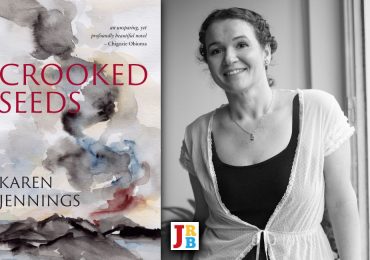

Fascinating, moving interview with Pettina Gappah. As a white woman with roots in Zimbabwe, learning to let myself write fiction, to claim access to all my sources (after a career in journalism), this was a feast!
Fascinating interview–well informed questions and a wonderful subject. Having just read and greatly admired The Book of Memory, I was shocked to learn that PG wrote it while suffering from a malady familiar to me, imposter syndrome. One reason might be sexism. In 1991, at a conference at Brown University, Tsitsi Dangarembga came down to breakfast first. A group of eight Nigerians entered the dining room and ignored her completely. When I entered and asked if I could join her, she was so welcoming–having been snubbed by fellow writers from Africa. Perhaps they thought she was an imposter.